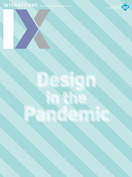Authors:
Alex Taylor, Daniela Rosner, Mikael Wiberg
Futures are rarely fixed, and this period of upheaval is no exception. We have little idea where the novel coronavirus will take us or how it will proceed, whether or not we accept the uncertainty. Yet some aspects of the current condition remain abundantly clear. The virus has not served as the great equalizer some initially predicted it to be. Instead, it has largely helped to re-entrench and even deepen inequities, highlighting the brutalities embedded in our existing systems, institutions, and governing bodies. From contact tracing apps to remote education routines, this set of final reflections takes the technologies we work on and with as a starting point for considering our collective fate. In particular, it takes a yearning for just futures as fodder for imagining how our worlds might be built otherwise. Christopher Frauenberger points to technological entanglements that change who we are in what he calls a crash course on ethical dilemmas. Focusing on digital contact tracing, Mary Gray and her colleagues consider the delicate balance between safety and surveillance in light of recent big-tech proposals. Ali Alkhatib breaks down the mechanisms of exclusion such contact tracing enables and advocates instead for investing in conditions for care. With questions of normalcy in mind, Alex Taylor looks at the potential for responding to injustices tied up in transactional logics in order to make possible a multiplicity of ways of being together in all aspects of our lives. Loren Britton and Helen Prichard embark on an experiment in reflection during the lockdown, sharing excerpts from conversations across scholarly and personal encounters. Finally, Nicole Rosner and Daniela Rosner look at how phrases like in solidarity can genuinely activate an ethics of care within and beyond technology worlds. Considering both the tensions and possibilities of technology design, the essays show that everyday practices, privileges, and precarities exasperated by the pandemic continue to meaningfully shape its evolving conditions.
©2020 ACM 1072-5520/20/07 $15.00
Permission to make digital or hard copies of all or part of this work for personal or classroom use is granted without fee provided that copies are not made or distributed for profit or commercial advantage and that copies bear this notice and the full citation on the first page. To copy otherwise, to republish, to post on servers or to redistribute to lists, requires prior specific permission and/or a fee.
The Digital Library is published by the Association for Computing Machinery. Copyright © 2020 ACM, Inc.









Post Comment
No Comments Found